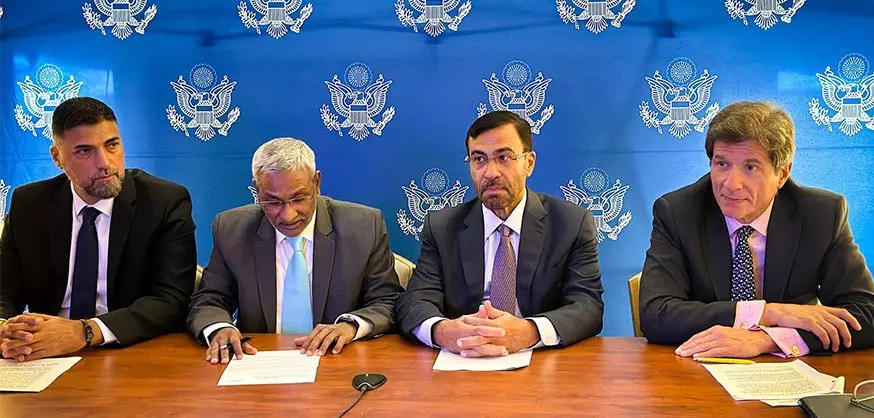
All you need to know about I2U2 group joint space venture
India, Israel, US, UAE plan to create a 'unique space-based tool' to help meet 'environmental and climate change challenges'

The I2U2 group, which includes India, has announced a joint space venture on the sidelines of the 78th United Nations General Assembly being held in New York.
The venture aims to create a “unique space-based tool for policymakers, institutions, and entrepreneurs” to help meet “environmental and climate change challenges” and apply space data “for the greater good of humanity”.
Significantly, this comes after India’s success with the Chandrayaan-3 and Aditya L-1 missions. Here’s what we know about the new joint space venture.
The I2U2 group and its objectives
The I2U2 group includes India, Israel, the United States, and the United Arab Emirates. It is often called the “West Asian QUAD”. The alliance was formed in October 2021 and held its first virtual meeting in July 2022.
According to the US Department of State website, “the Group aims to mobilize private sector capital and expertise to achieve a variety of goals, including modernizing infrastructure, advancing low carbon development pathways, and improving public health”.
It also states that the “I2U2 partnership projects and initiatives are not limited in geographic scope — the Group will explore opportunities anywhere it can make a positive impact”.
The aim of the Group is to identify “bankable projects and initiatives to tackle some of the greatest challenges confronting our world, with a particular focus on joint investments and new initiatives in water, energy, transportation, space, health, food security, and technology”.
On Thursday (September 21), the I2U2 group launched a website to strengthen public-private partnership in several sectors.
What is the new space venture about?
Though the details of the venture are not available yet, it is evident from a US Department of State press release that it will be a tool to help with mitigating environmental and climate change challenges.
The release says: “Primarily using the space-based observation data and capabilities of the four I2U2 partner countries, this project aims to create a unique space-based tool for policymakers, institutions, and entrepreneurs, enabling their work on environmental and climate change challenges and furthering our cooperation in the applications of space data for the greater good of humanity.”
The governments of India, Israel, the UAE, and the US are all signatories to the Artemis Accords, which are a set of principles designed to ensure cooperation in the exploration and peaceful use of the Moon, Mars, and other astronomical objects.
India’s space-exploration alliances
India has been collaborating with other countries in the space sector since the 1960s. It has been joining hands with countries such as the US, Russia, and France, among others, and more recently, with Saudi Arabia. Singapore has also expressed a desire to collaborate with India in space-related fields.
A regulatory overhaul in 2020 allowed private players in India to participate in the space sector and increased investment in the space industry. That same year, the government established the Indian Space Association (ISA). The ISA has been seeking collaboration with Saudi companies to foster business opportunities for space startups and the private sector.
During the recent visit by Prince Mohammed bin Salman bin Abdulaziz Al Saud, Crown Prince and Prime Minister of the Kingdom of Saudi Arabia, the two countries in a joint statement emphasized their commitment to cooperation in space-related fields. These include space exploration, satellite communication, satellite-based navigation, remote sensing, and much more.
ISRO has been working together with Saudi Arabia since a 2010 agreement was signed with the King Abdulaziz City for Science and Technology. The formation of the Saudi Space Commission in 2018 has given a boost to this tie-up.
(With agency inputs)

